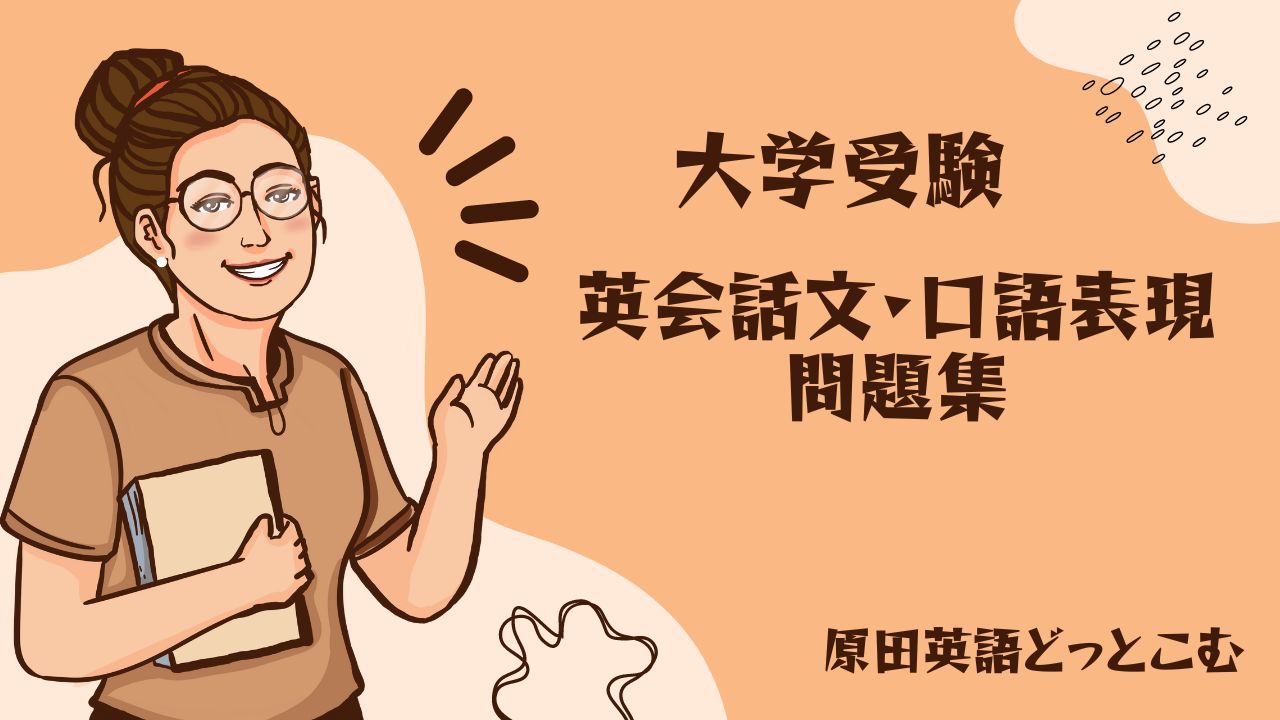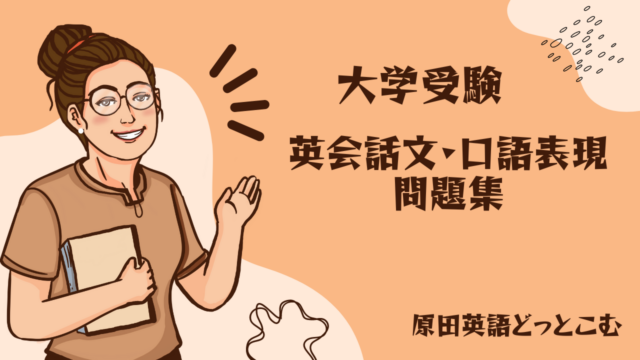111. 【青山学院大学(全学部)2024】
Dialogue A
Two police officers are eating lunch after visiting a crime scene.
Pete: Do you think we might have missed some evidence at the scene of the crime?
Sally: Come on! All you want to talk about is that jewelry store robbery.
Pete: It’s just that I really want to get to the bottom of it.
Sally: I do too! But can’t it wait until after we finish lunch?
[1] When Pete says that he really wants to “get to the bottom of it,” he means that he wants to ________.
1. recover what he left at the scene of the crime
2. dig under the jewelry store
3. find out who robbed the jewelry store
4. drop the subject of the jewelry store robbery
[1] 解答:3. find out who robbed the jewelry store
解説:PeteとSallyは警官で、犯罪現場を訪れた後に昼食を取っている。Peteは宝石店強盗について話したがっているが、Sallyはそれを昼食後まで待てないかと言っている。その中で、Peteは “get to the bottom of it” という表現を使っている。”get to the bottom of it” は、「真相を突き止める、物事の核心に迫る」という意味のイディオムです。したがって、Peteが “get to the bottom of it” と言っているのは、「宝石店を襲った犯人を突き止めたい」という意味になります。
1. recover what he left at the scene of the crime(犯行現場に置き忘れたものを取り戻す)は、文脈に合っていません。
2. dig under the jewelry store(宝石店の下を掘る)も、文脈に合っていません。
4. drop the subject of the jewelry store robbery(宝石店強盗の話題を止める)は、Peteが真相を追求したがっていることと矛盾します。
日本語訳:
Pete:犯行現場で何か証拠を見落としていないか心配だな。
Sally:もう!あなたときたら、宝石店強盗の話ばかりしたがるんだから。
Pete:この事件の真相を突き止めたいんだよ。
Sally:私だってそうよ!でも昼食が終わるまで待てないの?
————————————————–
【get to the bottom of it】
「真相を突き止める、物事の核心に迫る」
⇒何か複雑な問題や謎めいたことについて、その真相や原因を完全に理解しようと努力することを表現するときに使うイディオムです。「it」は、調査対象となっている事柄を指します。
<例文>
“The detective is determined to get to the bottom of the mystery.”(そのデティクティブはその謎の真相を突き止める決意だ。)
112. 【青山学院大学(全学部)2024】
Dialogue B
In art class, a student is making a figure out of clay under the watchful eye of the teacher.
Rita: How’s this, Mrs. Montgomery?
Mrs. Montgomery: Hmm. . . You might want to make the head a little rounder.
Rita: [Puts more clay on the figure] Like this?
Mrs. Montgomery: That’s it. Now you’re getting the hang of it. We’ll turn you into a professional artist before long.
[2] When Mrs. Montgomery tells Rita that she’s “getting the hang of it,” she means that Rita is ________.
1. mastering the technique
2. making the head hang down
3. making money as a professional artist
4. letting her mistakes get her down
[2] 解答:1. mastering the technique
解説:美術の授業で、RitaはMrs. Montgomeryの指導の下、粘土で人形を作っている。Mrs. MontgomeryはRitaに頭の部分をもう少し丸くするように助言し、Ritaがそれを直した後、”Now you’re getting the hang of it.”と言っている。
“get the hang of it”は、「(新しい技術や方法を)習得する、コツをつかむ」という意味のイディオムです。したがって、Mrs. MontgomeryがRitaに “getting the hang of it” と言っているのは、「(粘土細工の)技術を習得しつつある」という意味になります。
2. making the head hang down(頭を下に垂らす)は、文脈に合っていません。
3. making money as a professional artist(プロのアーティストとしてお金を稼ぐ)は、Mrs. Montgomeryが将来の可能性について言及しているものの、”getting the hang of it”の直接的な意味とは異なります。
4. letting her mistakes get her down(失敗に負けている)は、Ritaが上達していることと矛盾します。
日本語訳:
Rita:こんな感じでどうでしょう、モンゴメリー先生?
Mrs. Montgomery:うーん…頭の部分をもう少し丸くした方がいいかもしれないわね。
Rita:【人形に粘土を足す】こんな感じですか?
Mrs. Montgomery:そうそう、その調子。あなたはコツを掴みつつあるわ。このままいけばあなたをプロのアーティストにしてみせるわ。
————————————————–
【get the hang of it】
「(新しい技術や方法を)習得する、コツをつかむ」
⇒新しい技術や方法を学ぶ過程で、徐々にそれを上手く行えるようになることを表現するときに使うイディオムです。「it」は、習得の対象となっている技術や方法を指します。
<例文>
“Learning to drive can be challenging at first, but with practice, you’ll soon get the hang of it.”(運転の学習は最初は難しいかもしれないが、練習を重ねればすぐにコツを掴むことができるだろう。)
113. 【青山学院大学(全学部)2024】
Dialogue C
A young man is asking a friend to help in his job search.
Sidney: You really like your job at Sonic Corporation, don’t you? I hear they’re hiring now.
Thomas: That’s right. They’re looking for a new salesperson.
Sidney: Do you think you could put in a good word for me?
Thomas: I’d be happy to, but after that you’re going to have to go the distance on your own.
[1] When Sidney asks Thomas to “put in a good word” for him, he means that he wants ________.
1. Thomas to tell the boss an amusing story about him
2. to impress Thomas by showing that he knows important people
3. Thomas to tell his employer positive things about him
4. to add more words to his vocabulary
[2] When Thomas replies to Sidney, saying that he needs “to go the distance”
on his own, he implies that ________.
1. being a long distance runner might be an advantage
2. getting the job would also depend on Sidney’s efforts
3. the burden would be on Thomas to help him succeed
4. the friendship between Sidney and Thomas is too distant
解答:
[1] 答え:3. Thomas to tell his employer positive things about him
[2] 答え:2. getting the job would also depend on Sidney’s efforts
解説:
[1] “put in a good word”は「よい評価をする、推薦する」という意味のイディオムです。Sidneyは、Thomasに雇用主に自分の良いところを言ってもらいたいと頼んでいます。
1. “an amusing story”(面白い話)は文脈に合いません。
2. Sidneyが重要人物を知っていることを示してThomasを感心させようとしているわけではありません。
4. Sidneyの語彙を増やすことは文脈から外れています。
したがって、「3. Thomas to tell his employer positive things about him(Thomasに雇用主にSidneyの良いところを言ってもらうこと)」が正解です。
[2] “go the distance”は「最後までやり遂げる」という意味のイディオムです。Thomasは、良い言葉を言うことはできるが、その後は Sidney 自身の努力次第だと言っています。
1. 長距離ランナーであることは文脈に合いません。
3. Sidneyを助ける責任がThomasにあるとは述べていません。
4. SidneyとThomasの友情が疎遠だとは述べていません。
したがって、「2. getting the job would also depend on Sidney’s efforts(仕事を得ることはSidneyの努力次第でもある)」が正解です。
日本語訳:
Sidney:ソニック社での仕事、本当に気に入ってるんだね?今、人を雇っているそうじゃないか。
Thomas:そうなんだ。新しい営業職を探しているんだ。
Sidney:俺のことを良く言ってくれないか?
Thomas:喜んでそうするよ。でもそれ以降は、君自身の力で最後までやり遂げなくちゃいけないね。
【put in a good word】
「よい評価をする、推薦する」
⇒自分が良く知っている人物について、第三者に良いことを言うことを意味するイディオムです。就職や昇進などの場面で、他者への推薦として使われることが多いです。
<例文>
“If you’re applying for that position, I’d be happy to put in a good word for you with the manager.”(もしその職に応募するなら、喜んで上司にあなたのことを推薦するよ。)
【go the distance】
「最後までやり遂げる」
⇒困難な状況においても、目標を達成するまで粘り強く努力し続けることを意味するイディオムです。
<例文>
“It’s been a challenging project, but we’re determined to go the distance and see it through to completion.”(これは難しいプロジェクトだったが、私たちは最後までやり遂げ、完了まで見届ける決意です。)
114. 【青山学院大学(全学部)2024】
Dialogue D
Josh and Nancy are university classmates discussing their childhood
experiences.
Nancy: You’re always so well dressed, Josh. You must spend a fortune on clothes.
Josh: No, not really. Actually, I buy all my clothes at used clothing shops.
Nancy: No kidding? I never would have known. I thought you must come from a rich family.
Josh: Far from it. When I was growing up, my family lived “hand to mouth.”
40. When Josh says that his family lived “hand to mouth,” he means that they ________.
1. could only satisfy their basic and immediate needs
2. went from being extremely rich to terribly poor
3. had different table manners since they tended to eat with their hands
4. suffered from a disease called “hand to mouth”
解答:1. could only satisfy their basic and immediate needs
解説:
“hand to mouth”は「その日暮らしで」という意味のイディオムです。Joshは、自分の家族が昔はその日暮らしの生活をしていたと言っています。
2. 「極端に金持ちから貧乏になった」とは言及されていません。
3. 「手で食事をする傾向があったため、食事のマナーが違った」とは関係ありません。
4. “hand to mouth”は病気の名前ではありません。
したがって、「1. could only satisfy their basic and immediate needs(その日の基本的な必要を満たすことしかできなかった)」が正解です。
日本語訳:
Nancy:ジョシュ、いつもとてもよい服装をしているわね。服にお金をかけているのね。
Josh:いや、実はそうでもないんだ。古着屋で服を買っているんだ。
Nancy:冗談でしょ?知らなかったわ。お金持ちの家庭の出身だと思っていたのに。
Josh:全然違うよ。子供の頃、うちはその日暮らしの生活だったんだ。
————————————————–
【hand to mouth】
「その日暮らしで」
⇒生活に必要な食べ物や金銭が十分になく、その日その日をどうにか凌いでいる状態を表すイディオムです。
<例文>
“After losing his job, he found himself living hand to mouth, barely able to afford food and rent.”(彼は仕事を失った後、食べ物や家賃を払うのがやっとのその日暮らしの生活をしていることに気づいた。)
115.【明治大学 (国際日本学部)2024】
Tim: Hey, Kent. We have to take these chairs into the next room. Can
you ________?
Kent: Sure. Is it for tomorrow’s conference?
1. give me a break
2. give me a chance
3. give me a hand
4. give me a hint
“give me a hand”は「手を貸してくれる?」という意味のイディオムです。ケントに椅子の移動を手伝ってほしいとティムが頼んでいます。
1. “give me a break”は「勘弁してくれ」という意味で、文脈に合いません。
2. “give me a chance”は「チャンスをください」という意味で、文脈に合いません。
4. “give me a hint”は「ヒントをください」という意味で、文脈に合いません。
日本語訳:
ティム:ねぇ、ケント。この椅子を隣の部屋に運ばないと。手伝ってくれる?
ケント:もちろん。明日の会議のため?
【give (someone) a hand】
「手を貸す、手伝う」
⇒誰かを助けたり、支援することを意味するイディオムです。
<例文>
“Can you give me a hand with these heavy boxes?”(この重い箱を運ぶのを手伝ってくれる?)



